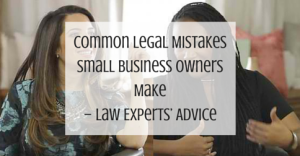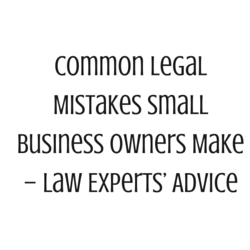Think your business is too small to justify paying for professional legal help? Think again. Failing to to understand the important legal matters for your crafting business can expose you to significant risk, and the most cost-effective time to understand them is often before your handmade business is booming.
 Here is some legal advice from legal experts:
Here is some legal advice from legal experts:
Misunderstanding Ownership Of Creative Assets
You may not think the products you sell, the services you offer, or even the business name and logo you use warrant legal protection. However, when it comes to work that qualifies for trademarks, patents, and copyrights, it’s generally less expensive to obtain protection shortly after developing your IP than having to protect it later (especially if a third-party starts using something similar). – Marc Misthal of Gottlieb, Rackman & Reisman.
Misunderstanding Copyright Laws
Do you ever repost other people’s content on your website, share it with customers via an email or a newsletter, or supplement your original blog posts with images you find online — and presume that you’re legally “covered,” provided that you give credit to the author and link back to the site where the material originally appeared?
If so, you’re exposing your business to possible copyright violation fines and/or legal action. “If you copy someone else’s work wholesale or even substantially, it’s most likely copyright infringement. While there are exceptions or defenses of ‘fair use’ (criticism, commentary, news reporting, teaching, scholarship, or research), defenses to copyright infringement are limited and should not be relied upon without consulting an attorney”. – Ashley Dobbs of Bean, Kinney & Korman.
Trying To Handle Disputes On Your Own
Tackling legal issues yourself to save money may prove penny wise and pound foolish. For example, if you are ever contacted by another lawyer, hire your own to respond. “Whatever you say in response to that attorney is testimony and can be used as evidence in a legal dispute; your attorney’s communication is not evidence or testimony,”
Likewise, if anyone else is involved in your business or its future profits, hire competent counsel to document the company’s ownership and draft shareholder agreements. “This is what I call ‘knowing how you get divorced before you get married,’” he says. “Lack of documentation of ownership, transfer of ownership interest, payment of profits, etc., typically leads to protracted and unnecessary lawsuits.” – Gordon Berger of FordHarrison.
Moreover, Marie Forleo from Marie TV asked Jo-Ná Williams to identify the most common mistakes entrepreneurs make and to offer some advice for correcting the errors (in case any of them sound familiar).

So what are your thoughts about it? Do you think your business is at risk? Have you experienced one of these legal mistakes? What have you done to make it right? Please share it with us in the comment box below.
(Disclaimer: This video and accompanying content (blog, YouTube descriptions, etc. herein referred to as “Content”) is for informational purposes only and should not be construed as legal advice of any kind. Jo-Ná Williams and J.A.Williams Law, P.C. assumes no liability for use or interpretation of any information contain in this Episode or this document. This Episode should not be an alternative to obtaining legal advice from a licensed attorney in your state based on the specific facts of your legal matter. Jo-Ná Williams is licensed to practice law in the State of New York only.)
- DIY Chicken Wire Jewelry Holder - June 27, 2022
- Jewelry Designer Manager Alternative - December 8, 2019
- 3 Tips To Immediately Boost Your Sales Today - May 12, 2019

